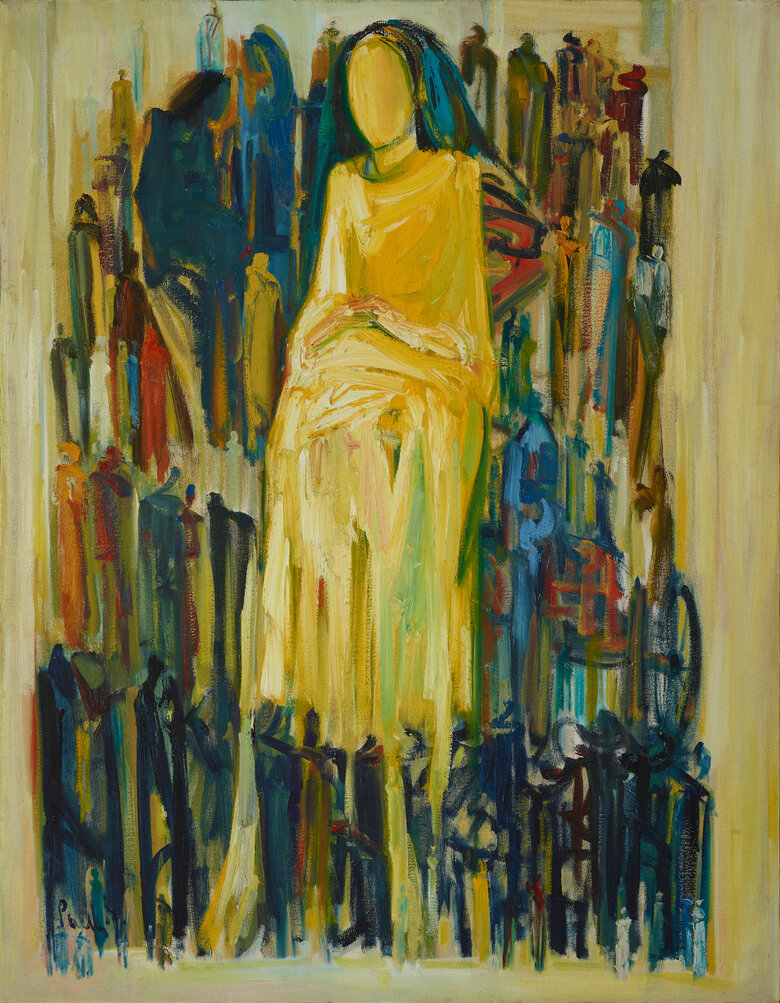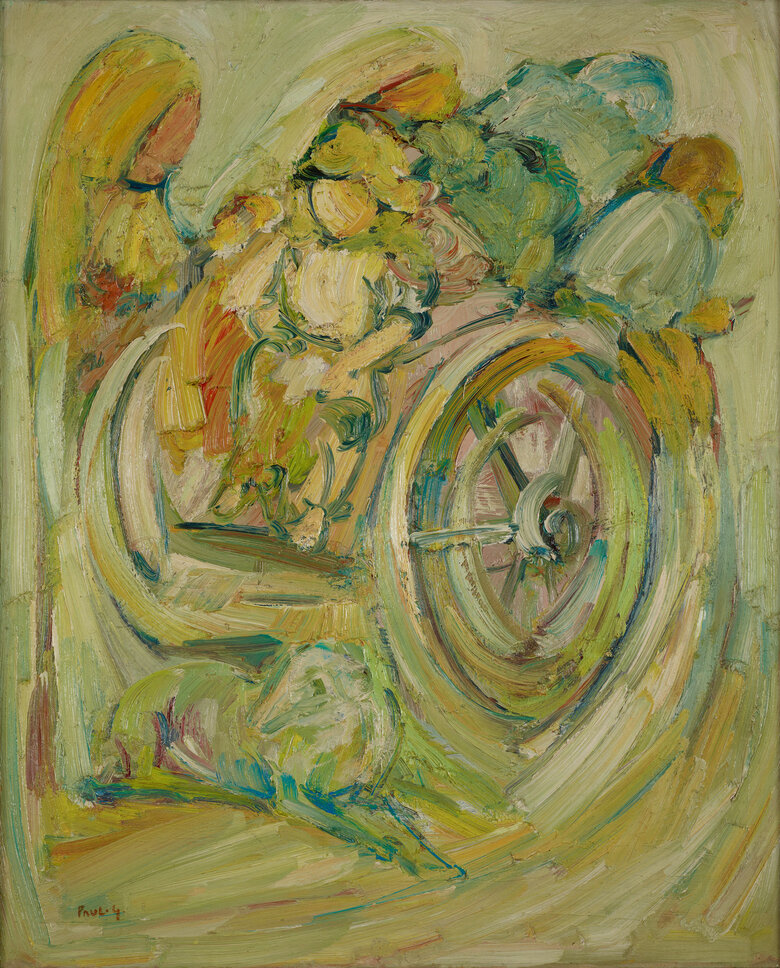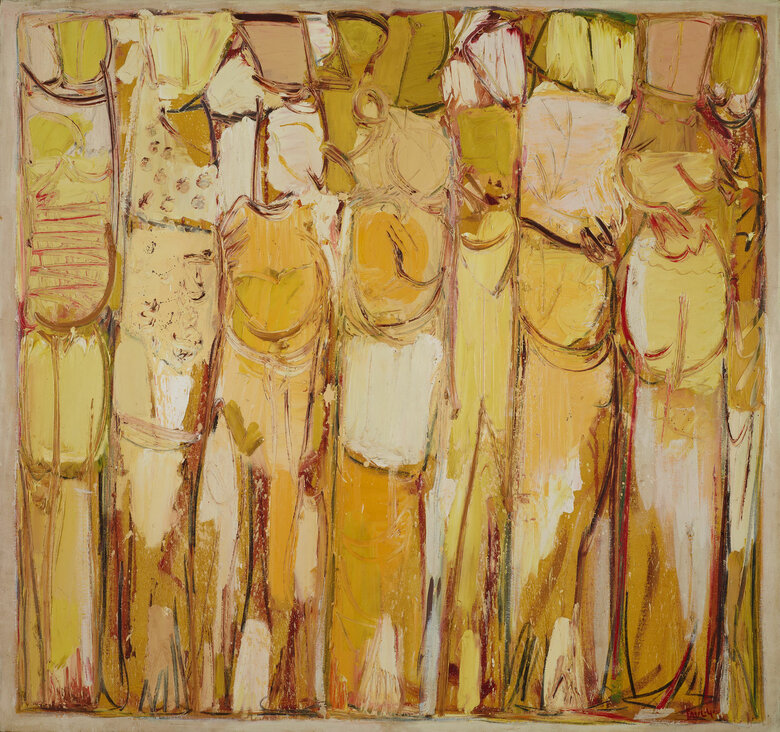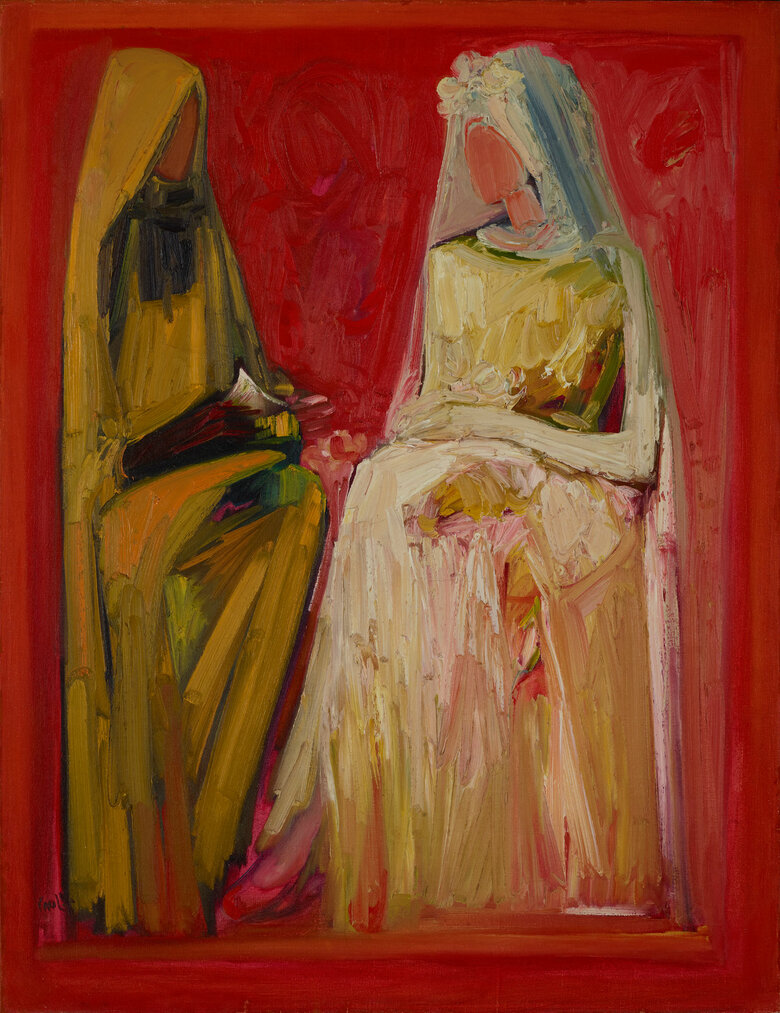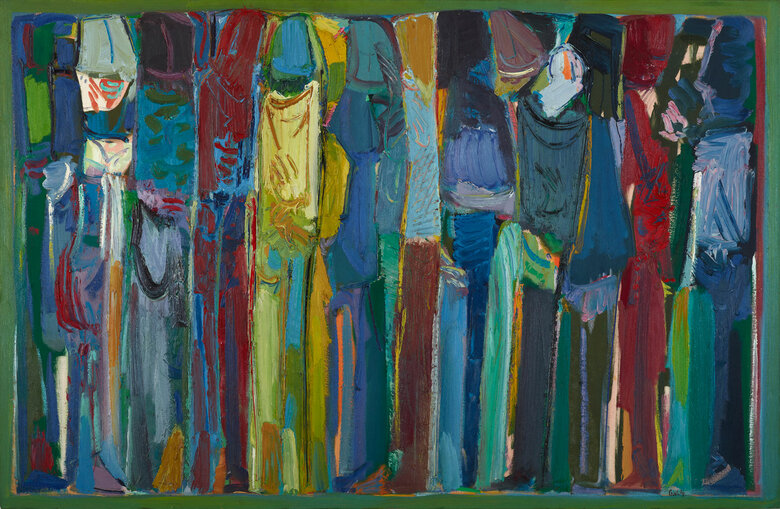Paul Guiragossian was born in 1926 in Jerusalem, Palestine, to Armenian parents survivors of the 1915 Armenian Genocide. Guiragossian later took Lebanon as his permanent home and received Lebanese...
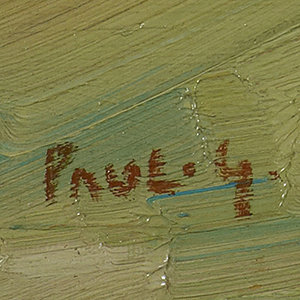

PAUL GUIRAGOSSIAN, Lebanon (1926 - 1993)
Bio
Written by WAFA ROZ
Paul Guiragossian was born in 1926 in Jerusalem, Palestine, to Armenian parents survivors of the 1915 Armenian Genocide. Guiragossian later took Lebanon as his permanent home and received Lebanese citizenship. Forced into exile, his parents relocated from Iskenderun to Jerusalem, where both Paul and his younger brother Antoine were raised. Paul's father, a blind fiddler back then, was hardly present. His mother, Rahel, had to struggle to make ends meet. As a result, Paul remained in the custody of nuns at the Order of the Daughters of St. Vincent de Paul in Jerusalem; from age four till the age of seven[i]. Then, Paul lived at the orphanage of the Salesian priests and completed his formative education at Ratisbonne seminary of the Salesian community of St. Don Bosco, in Bethlehem.[ii]
Recognizing his remarkable talent, resident priests took Paul on as an apprentice in stained-glass making.[iii] Some sources state that he trained under icon-maker, Pietro Yagetti, and at a place called Studio Yarcon, most likely in Jaffa.[iv] What is certain is that in the mid-1930s, he became an apprentice at the studio of Italian painter Fernando Manetti. Also, during this period, he learned Arabic Calligraphy with a local Sheikh. [v]As the Zionist assault on Palestine escalated in 1947, the Guiragossian’s relocated to Lebanon. They first settled in Camp Trad in Burj Hammoud, a northern suburb of Beirut populated with Armenian refugees. Paul worked as an art instructor at several Armenian high schools in Beirut, where he met Juliette Hindian, who became his wife in 1952. Hindian was also an artist in her own right.
Guiragossian did not follow a conventional learning path. His early works granted him multiple scholarships. Based on his prized paintings shown in 1956 at the Salon d’Automne, Palais de L’Unesco in Beirut, the Italian cultural institute granted him a scholarship to study at the Academia di Belle Arti in Florence from 1957 till 1958. Likewise, in 1962, he received a grant from the French government to study at Les Atelier Des Maîtres De L’Ecole De Paris for six months. That was three years after he had won a prize for La Vendeuse de Fleurs, 1958, oil on canvas painting, presented at the first edition of the Paris Biennale in 1959.
Since an early age, Guiragossian was an avid reader and inquisitive researcher. Surpassing cultural and geographical boundaries, he investigated art history from East to West. The stylized marble-carved Pharaonic facial features, the stillness of Sumerian statuettes, and the intricate details in both Japanese printmaking and miniatures of Islamic art equally thrilled Guiragossian. Renaissance masters such as Albrecht Dürer, Jan Van Eyke, and Raphael inspired him most. The famed Van Gogh, whom Guiragossian initially undervalued, later became his idol. About artists that had influenced him at distinct stages of his career, Guiragossian once said, " I admired Van Gogh greatly so that I would impersonate him. I would walk like him, dress like him, and paint nature and the poor like him…bit by bit I would rid myself of Van Gogh."[vi]
Indeed Guiragossian became taken with the living conditions of the poor. In his early works, he depicted the dingy slums of Burj Hammoud and translated the misery of its inhabitants. Using oil paint on Masonite or canvas, he painted poor people day-to-day. For instance, Misère, 1948, portrays a drained worker resting by the floor, while La Crise, 1948, shows a fatigued porter. Preparation du Dejeuner, 1951, features a man rolling up the dough for daily breakfast. In Au Marche, 1951, women amass in a pack at the public market. In this genre, human figures, painted in somber colors and often outlined in black, seem round and massive in form. They have big hands and hulky bare feet. In that, the artist highlights the harsh life they bore.
Guiragossian produced a rich corpus of portraitures, mainly during the period spanning between the late 1940s and mid-1950s. He painted his neighbors, relatives, old men, women, and children in his neighborhood. The most poignant of all is that of his elderly mother Rahel, 1948, executed with oil on Masonite. She sits round-shouldered dressed in black and worn-out. Sharp lines map her face mirroring that hardship. Using charcoal on paper, Guiragossian unearthed the smallest facial detail in a portrait, such as in Garabeth Kasparian, 1948. Besides, he could reveal bodily gestures and facial expressions in swift and quick squiggles, such as in a collection of drawings he made during 1950 and 1951 using pen on paper. This immediacy in gestural application is what later distinguishes Guiragossian’s style.
In Beirut's art scene, Guiragossian became a sought out artist and scenographer. A year after he had arrived in Lebanon, he befriended author and art critic Salah Stetie who opened up new horizons for the emerging artist. In the 1950s, Guiragossian met his life-long friend and theatre director, Jalal Khoury, at Café La Palette in Beirut. La Palette was an accessible space where artists and intellectuals gathered and where Guiragossian would later hold his first solo show. Guiragossian handled the stage-design of some of Khoury’s most prestigious theatre productions, such as The Vision of Simon Machard in 1964 and Jeha fil qoura al-amamiyyah in 1971. Moreover, he collaborated with playwright Oussama Al-Aref on his epic production, idrab el-haramieh, in 1970.[vii] Guiragossian created monumental quasi-figurative paintings to display as stage-backdrops. These backdrops were not merely aesthetic add-ons, but rather a complimentary visual to the productions’ political contents.
Guiragossian’s style straddled the line between figurative and abstract art. He took the human form as a central object of study and his personal experience as a source of inspiration. In the 1960s, he started depicting the human figure in an abstracted form. In doing so, he transformed a personal-local experience into a universal one. In his early abstract trials, the human form was fragmented. Guiragossian applied layers of paint in short, interrupted rectangular brushstrokes that steadily built up the details of the body. The final result looked very much like a mosaic best exemplified in Le Panier, 1962, oil on canvas painting of a woman, two girls, and a basket, tightly intertwined. Painted with striking complementary colors such as indigo-blue and orange, beside lemon-green, Le Panier has luminosity similar to that of stained glass. At this stage, his figures were still full; however, their facial features were utterly effaced. With time, nearing the 1970’s Guiragossian’s human figures became slender and elongated. Some mere abstract human depictions were painted with a single lengthy and broad brushstroke applied vertically onto the surface of a canvas, such as in Silence, c.1969. One could still see the negative space in-between his gestural slashes.
Through his career, Guiragossian revisited themes such as family, faith, despair, exile, and belonging. Still, the specter of the woman remained central to his oeuvre, and often represented as maternal and spiritual symbols. For example, as the Virgin Mary in Madonna and Child, c.1957, the reader in La Lecture, 1973, the friend in L’Amitié, 1973, the source of light in Beacon Over the City, 1977, and the mother in Le Centre Du Monde, 1983. Even more, the veiled woman archetype kept reminding us of the nuns he grew up with. In the aforementioned examples, Guiragossian applied a restricted color palette with either a matching background or a contrasting one. For instance, in Madonna & Child, the dominating orange against golden yellow radiates an intense light that resonates with early Byzantine icons.
In Guiragossian’s most celebrated paintings, erect figures congregate and huddle together, such as in La Lutte de l'Existence, 1988, painted during a period when violent confrontations blazed up in Beirut nearing the end of the Lebanese Civil War. In this painting and many others, Guiragossian's gathered figures resonate with Christ’s apostles' figurative representation, usually staged in a standing position in both Eastern Orthodox icons and old master’s paintings like Pietro Perugino’s fresco, Christ Giving the Keys of the Kingdom to St. Peter, 1482. However, Guiragossian evaded spatial depth or indication of place. Elaborating on the matter, Guiragossian once explained: “I let the figures float on a canvas, I don’t draw a land, I don’t draw a sky, so you don’t know where they are.” It is fair to assume that Guiragossian’s work was informed by the liturgical arts he was exposed to, namely Icons and Christian religious depictions, during his early years in the Salesian churches, in Palestine. Guiragossian’s canvases accumulated massive impasto layers of paint always applied in swift gestural brush strokes pronouncing his unbeatable style.
A prolific artist, Guiragossian, never stopped painting, even during the Lebanese Civil War (1975-1990), when most artists, especially Palestinians, fled the country. Besides, he painted during his extended stay at the hospital, after his unfortunate elevator accident. [viii]Certainly, through painting, Guiragossian escaped his feelings of suffering and misery.
“In 1974 Guiragossian was in an elevator that got stuck midway between floors due to a power cut.” [People confined in the elevator panicked]. So, “he broke the glass door for some air. At that moment, the power came back on, and the lift started to move. Unfortunately, his leg got jammed and then severed. He lost his leg and had to wear a prosthetic.”
Over the years, Juliette Hindian, the artist's supportive partner, assumed a pivotal role in organizing Guiragossian's exhibitions. Later, Guiragossian's two elder sons Emanuel and Jean-Paul, both established painters, would also accompany their father on several exhibition trips. On November 20th, 1993, Guiragossian completed his last painting, later entitled L’Adieu, 1993 in which he was able to merge the early and advanced stages of his art creation. Right after, he shared his achievement with his youngest daughter Manuella, a contemporary artist now. On that same day, Paul Guiragossian passed away unexpectedly of a heart attack at his home near Rabieh in Mount Lebanon.
Endnotes
[i] Bardawil, Sam and Till Fellrath, “Paul Guiragossian: Displacing Modernity, “In Paul Guiragossian Displacing Modernity, by Sam Bardaouil et al., p.23, Italy, Silvana, 2018.
[ii] Bardawil, Sam and Till Fellrath," Paul Guiragossian: Displacing Modernity,” In Paul Guiragossian Displacing Modernity, by Sam Bardaouil et al., p.24, Italy, Silvana, 2018. Check also: Bardaouil, Sam. "Paul Guiragossian: The Human Condition OR An Entry into the Study of Arab Modernity." Academia.edu,p.2. www.academia.edu/5291536/Paul_Guiragossian_the_Human_Condition_OR_An_Entry_into_the_Study_of_Arab_Modernity,
[iii] Bardawil, Sam and Till Fellrath," Paul Guiragossian: Displacing Modernity,” in Paul Guiragossian Displacing Modernity, by Sam Bardaouil et al., pp.24-25, Italy, Silvana, 2018. Bardawil, Sam and Till Fellrath," Paul Guiragossian: Displacing Modernity,” in Paul Guiragossian Displacing Modernity, by Sam Bardaouil et al., pp.24-25, Italy, Silvana, 2018.
[iv] Bardawil, Sam and Till Fellrath, “Paul Guiragossian: Displacing Modernity,” in Paul Guiragossian Displacing Modernity, by Sam Bardaouil et al., p.26, Italy, Silvana, 2018.
Note: More on this can be found in Farouk Al-Boukaily, 'ma'bad al-fann (The Temple of Art). Document located in the Paul Guiragossian Foundation archives.
[v] Bardawil, Sam and Till Fellrath,” Paul Guiragossian: Displacing Modernity,” in Paul Guiragossian Displacing Modernity, by Sam Bardaouil et al., pp. 27-28. Italy, Silvana, 2018.
[vi] Bardaouil, Sam. "Paul Guiragossian: The Human Condition OR An Entry into the Study of Arab Modernity." Academia.edu,pp3 www.academia.edu/5291536/Paul_Guiragossian_the_Human_Condition_OR_An_Entry_into_the_Study_of_Arab_Modernity.
[vii] “Guiragossian presented four monumental paintings: Le Cycle de La Vie, La Guerre et a Paix, Une Funéraille Historique, a tribute to the Egyptian President Gamal Abdel Nasser, and La Vie et La Joie – also known as Antiques, plus 33 smaller paintings, as stage-backdrops in the play idrab el-haramieh, performed and directed by renowned theatre directors Nidal Al-Ashkar and Roger Assaf.”
Bardawil, Sam and Till Fellrath,” Paul Guiragossian: Displacing Modernity,” In Paul Guiragossian Displacing Modernity, by Sam Bardaouil et al., pp.72, Italy, Silvana, 2018.
[viii] Interview with Manuella Guiragossian.
Ayad, Myrna. "Remembering Paul Guiragossian: 'My Father, the Greatest Storyteller I Know.'" The National. The National, February 3, 2020. https://www.thenational.ae/arts-culture/art/remembering-paul-guiragossian-my-father-the-greatest-storyteller-i-know-1.973034
Sources
Ayad, Myrna. "Remembering Paul Guiragossian: 'My Father, the Greatest Storyteller I Know.'" The National. The National, February 3, 2020. https://www.thenational.ae/arts-culture/art/remembering-paul-guiragossian-my-father-the-greatest-storyteller-i-know-1.973034
Bardaouil, Sam. “Paul Guiragossian: the Human Condition OR An Entry into the Study of Arab Modernity.” Academia.edu. Accessed April 29, 2020. https://www.academia.edu/5291536/Paul_Guiragossian_the_Human_Condition_OR_An_Entry_into_the_Study_of_Arab_Modernity.
Biography. Accessed April 29, 2020. http://www.paulguiragossian.com/en/DynamicPages/biography/biography.
Boullata, Kamal, and John Berger. “Palestinian Art 1850-2005.” Amazon. Saqi, 2009. https://www.amazon.com/Palestinian-Art-Present-Kamal-Boullata/dp/0863566480.
Gronlund, Melissa. “The UAE Pays Homage to Beiruti Modernist Paul Guiragossian.” The National. The National, February 28, 2018. https://www.thenational.ae/arts-culture/art/the-uae-pays-homage-to-beiruti-modernist-paul-guiragossian-1.708730
“Icon Art.” Icon Painting, Icons. Accessed April 29, 2020. http://www.visual-arts-cork.com/painting/icons.htm.
Paul Guiragossian. Accessed April 29, 2020. http://www.encyclopedia.mathaf.org.qa/en/bios/Pages/Paul-Guiragossian-.aspx.
“Paul Guiragossian.” Paul Guiragossian. Accessed April 29, 2020. http://paulguiragossian.com/.
“PAUL GUIRAGOSSIAN (LEBANESE, 1925-1993) , La Lutte De L'Existence.” , La Lutte de l'Existence | Christie's. Accessed April 29, 2020. https://www.christies.com/LotFinder/lot_details.aspx?intObjectID=5728313.
"Paul Guiragossian (Lebanese, 1926-1993), Automne (Autumn)." , Automne (Autumn) | Christie's. Accessed April 29, 2020. https://www.christies.com/LotFinder/lot_details.aspx?intObjectID=5875475.
"Paul Guiragossian (Lebanese, 1926-1993), La Famille." , La famille | Christie's. Accessed April 29, 2020. https://www.christies.com/LotFinder/lot_details.aspx?intObjectID=5486429.
“Paul Guiragossian: Displacing Modernity.” Paul Guiragossian Displacing Modernity ARTBOOK | D.A.P. 2018 Catalog Silvana Editorale Books Exhibition Catalogues 9788836639076, October 23, 2018. https://www.artbook.com/9788836639076.html
Meeting Paul Guiragossian https://www.youtube.com/watch?time_continue=216&v=QdHObQrdP0w&feature=emb_logo
Archives Télé Liban Moukabalat - مقابلات https://www.youtube.com/watch?v=2aGKtt4vUz8
CV
Selected Solo Exhibitions
2018
Paul Guiragossian: Testimonies of Existence, Barjeel Art Foundation, Sharjah, UAE
2017
Paul Guiragossian, Galerie Tanit, Beirut, Lebanon
2013
Paul Guiragossian: The Human Condition, Beirut Exhibition Center, Beirut, Lebanon
2011
Paul Guiragossian: Retrospective, the Paul Guiragossian Museum, Jdeideh, Lebanon
2008
L’Empire des Mères, Emmagoss Art Gallery, Beirut, Lebanon
2007
Dar Al Funoon, Exhibition of watercolors, Kuwait
2004
The Press Club, Press Headquarters Center, Beirut, Lebanon
Notre Dame University auditorium, Zouk, Lebanon
2003
Green Art Gallery, Dubai, UAE
2002
Emmagoss Art Gallery, Beirut, Lebanon
2000
L’Art Du Portrait Dans L’Art de Paul Guiragossian, Centre Culturel Francais, Beirut, Lebanon
1999
Images of Faith, Downtown Beirut, Lebanon
1997
Emmagoss and La Faculté des Beaux-Arts et des Arts appliqués de l'Université du Saint-Esprit (USEK), Kaslik, Lebanon
1995
Blancs et Noir, Emmagoss Art Gallery, Zalka, Lebanon
1994
Paul Guiragossian Wal Masrah: Shaghaf Da’em (Paul Guiragossian and the Theater: A Constant Passion), Masrah El Madeenah, Beirut, Lebanon
Paul Guirgossian, Emmagoss Art Gallery, Zalka, Lebanon
1993
Variations Dramatiques, Association for the Promotion of Music in the North of Lebanon, Barsbay Tower, Tripoli, Lebanon
Akhnaton Gallery, Cairo, Egypt
1992
Loubnan Assalam (The Peace That is Lebanon), The Glass Hall of the Lebanese Ministry of Tourism, Beirut, Lebanon
Park Hotel, Chtaura, Lebanon
1991
Paul Guiragossian in Los Angeles, Tekeyan Cultural Association, Los Angeles, US
International Art Center, Zalka, Lebanon
Paul Guiragossian Retrospective, Centre Culturel Français, Beirut, Lebanon
Belmont Hotel, Ehden, Lebanon
Soviet Cultural Center, Beirut, Lebanon
Institut du Monde Arabe,
Paris, France
1990
The Chahba Cham Palace, Aleppo, Syria
Maarouf Saad Art Center, Sidon, Lebanon
Galerie Pays de Cham, Damascus, Syria
1989
Salle Des Pas Perdus, Unesco, Paris, France
1988
Genocide and Renaissance, Armenian Students Association of BUC/NDU, Lebanon
Galerie G. Tabbal,
Beirut, Lebanon
1987
Galerie G. Tabbal, Beirut, Lebanon
Tekeyan Cultural Association, New York, Los Angeles, US; Montreal, Canada
St. John’s Armenian Church hall, Detroit, US
Platform International Gallery, Washington D.C., US
Hovnanian Armenian School, New Jersey, US
1986
Galerie La Toile, Rimal, Zouk, Lebanon
Lebanese – Soviet Friendship Days, Applied Arts of Lebanon, National Arts Museum of Belarus, Minsk, Belarus
The Roots of Cedars, Sahakian College, Beirut, Lebanon
Tribute Celebration, Der Melkoni, Bourj Hammoud, Lebanon
1985
Al Zahra (The Flower), The Cultural Center of Arts & Letters of Kuwait, Kuwait
Galerie d'Art Bekhazi, Ashrafieh, Lebanon
Faqra Club, Faqra, Lebanon
The Belmont Hotel exhibition hall. Cultural Movement of Zgharta ,Ehden, Lebanon
Bank Petra hall, Amman, Jordan
1984
Du Genocide à La Renaissance, Salle Gulbenkian, The Armenian Catholicosate of Antelias, Antelias, Lebanon
Al Zahra (The Flower), Secours Populaire Libanais, Hotel Carlton, Beirut, Lebanon
1983
Galerie d'Art Bekhazi, Ashrafieh, Beirut, Lebanon
Ministry of Tourism Glass Hall, Hamra, Lebanon
1982
National Museum of Fine Arts of Jordan, Amman, Jordan
1981
Gebraniat, Ministry of Tourism Glass Hall; Gallery One, Casino du Liban, Beirut, Lebanon
1980
Celui qui croyait à ses yeux et à ses mains. (Paul Guiragossian illustrating the poems of Jacques Lebreton), Cultural Mouvement of Antélias. St. Elie church hall., Antelias, Lebanon
Galerie Chahine, Beirut, Lebanon
1979
The National Council of Culture, Arts & Letters, Kuwait city, Kuwait
1978
The National Council of Culture, Arts & Letters of Kuwait, Kuwait city, Kuwait
Association of the Armenian Red Cross, Club Azadamard, Jeïtawi, Lebanon
Galerie Elcir, Mkalles, Lebanon
1977
Paix et Vie, St Elie church, Antelias, Lebanon
Palais de la Culture au Liban, Rabieh Club, Rabieh, Lebanon
The National Museum of Damascus (Retrospective), Damascus, Syria
1974
Studio 27 Gallery, Beirut, Lebanon
Al Zahra (The Flower), Secours Populaire Libanais (Together for Mankind), Beirut, Lebanon
La Famille, Modulart, Beirut, Lebanon
1973
Studio 27 Gallery, Beirut, Lebanon
1972
Artists Union, Yerevan, Armenia
Studio 27 Gallery, Beirut, Lebanon
1970
Paul Guiragossian: Recent paintings. The Corcoran Gallery of Art, Washington D.C., US
L'Orient Hall (L'Orient newspaper's hall), Beirut, Lebanon
Hotel Normandy, L'Atelier d'Art Dramatique de Beyrouth (The Strike of Thieves Play), Beirut, Lebanon
1969
Galerie L’Amateur, Beirut, Lebanon
1967
Galerie L’Amateur, Beirut, Lebanon
1966
L'Orient Hall (L'Orient newspaper's hall), Beirut, Lebanon
1964
Galleria d'Arte Cairola, Milan, Italy
Internales Kultur und Austauschzentrun, Gartenhaus, Frankfurt, Germany
American University of Beirut Alumni Association (Retrospective), Beirut, Lebanon
1963
Galerie Alecco Saab, Beirut, Lebanon
L'Orient Gallery (L'Orient newspaper hall), Beirut, Lebanon
1962
Galerie Alecco Saab, Beirut, Lebanon
Galerie Mouffe, Paris, France
1961
Galerie Alecco Saab, Beirut, Lebanon
1960
Centre d'Etudes Superieures, Beirut, Lebanon
Galerie Alecco Saab, Beirut, Lebanon
1959
Centre d’Etudes Superieures, Beirut, Lebanon
1958
Galeria d'Arte Moderna La Permanente, Florence, Italy
1956
Café La Palette, Beirut, Lebanon
1955
Centre d’Etudes Superieures, Beirut, Lebanon
1954
Café La Palette, Beirut, Lebanon
Selected Group Exhibitions
2023
Beirut And The Golden Sixties: A Manifesto Of Fragility, Mathaf, Arab Museum of Modern Art, Doha, Qatar
Je Suis Inculte! The Salon d’Automne and the National Canon, Sursock Museum, Beirut, Lebanon
2022
Manifesto of Fragility: Beirut and The Golden Sixties, Lyon Museum of Contemporary Art, Lyon, France
Memory Sews Together Events That Hadn’t Previously Met, Sharjah Art Museum, Sharjah, United Arab Emirates
2020
A Glimpse Into The Past, Galerie Tanit, Beirut, Lebanon
2018
Face Value: Portraiture, a gallerist’s Personal Collection, Saleh Barakat Gallery Beirut, Lebanon
A Century In Flux, Sharjah Art Museum, Sharjah, UAE
2017
L’Emozione dei COLORI nell’arte, Galleria Civica d’Arte Moderna e Contemporanea (GAM) and Castello di Rivoli Museo d’Arte Contemporanea, Turin, Italy
Lines of Subjectivity: Portrait and Landscape paintings, Jordan National Gallery of Fine Arts, Amman, Jordan
100 Chefs D'oeuvre de l'Art Moderne et Contemporain, Institut du Monde Arabe, Paris, France
Modern Art from the Middle East, Yale University Art Gallery, New Haven, US
Imperfect Chronology: Arab Art from the Modern to the Contemporary - Debating Modernism I. Whitechapel Gallery, London, UK
Chrétiens d'Orient: 2000 Ans d'Histoire. Institut du Monde Arabe, Paris, France
2016
The Short Century, Sharjah Art Museum, Sharjah, UAE
The Sea Suspended, Tehran Museum of Contemporary Art, Tehran, Iran
2015
Saltwater, 14th Istanbul Biennial, Istanbul Modern Art Museum, Istanbul, Turkey
2014
Sky Over The East, Emirates Palace, UAE
2013
The Family, (Paul, Emmanuel, Jean Paul and Manuella Guiragossian). Anima Gallery, Doha, Qatar
Re:Orient: Investigating Modernism in the Arab World 1950s - 70s, Barjeel Art Foundation, Sharjah, UAE
2010
Pieces for a Museum, (Paul Guiragossian and Shafic Abboud), Dora, Lebanon
2009
Landscapes. Cityscapes. 1, Maqam gallery, Saifi Village, Beirut, Lebanon
The Responsive Hand Drawings 1, Maqam gallery, Saifi Village, Beirut, Lebanon.
Artspace DIFC inaugural exhibition, Dubai, UAE
2008
ItaliaArabia, Chelsea Art Museum, New York, US
1994
XVII Salon d'Automne, Musée Nicolas Sursock, Beirut, Lebanon
1993
Still Life in Lebanese Art, Alumni Association and the Humanities Division of Beirut University College (BUC). Sheikh Zayed Hall, BUC, Beirut, Lebanon
1991
Lebanese Modern Art, The Egyptian Ministry of Culture. Akhenaten Hall Art Center, Cairo, Egypt
Lebanese Landscape, Beirut University College (BUC) Alumni Association and the Humanities Division, Sheikh Zayed Hall, BUC, Beirut, Lebanon
Contemporary Art from the Permanent Collection, Institut du Monde Arabe, Paris, France
1989
Paul and Emmanuel Guiragossian, Darat Al-Funun, The Khalid Shoman Foundation, Amman, Jordan
1988
Contemporary Lebanese Artists, Kufa Gallery, London, UK
2nd Baghdad International Arts Festival, The Iraqi Ministry of Culture and Information, Baghdad, Iraq
War and Love, (Works by 11 Lebanese Contemporary Artists touring the United States until the end of 1988). US
Les Cimaises Gallery, Holiday Beach, Zouk Mosbeh, Lebanon
1986
Art for Humanity, Baghdad International Festival of Arts, Baghdad, Iraq
1978
Salon de Mai, Municipality Palace, Zouk Mikael, Lebanon
1977
Lubnan 78, Dar Al-Fan Wal-Adab (The House of Art and Literature). Beirut, Lebanon
Paul Guiragossian, Seta Manuokian & Omran Al-Kaysi, Intercontinental Hotel, Riyadh, Saudi Arabia
Exposition De Peinture, Museo Del Folklore Romano, Rome, Italy
L'Exposition des Amis de Charbel, Galerie DAMO, Antelias, Lebanon
1974
The first exhibition for the artists in El-Metn, (region in Lebanon), The North Metn Council for Culture. Beirut, Lebanon
1972
16 Lebanese Artists, Centro d’Arte La Barcaccia, Roma, Italy
1971
Contemporary Art from Lebanon, Smithsonian Institution Traveling Exhibition Service, US
1970
Galerie l'Amateur, Beirut, Lebanon
1969
Exposition Collective de Peintres Libanais et Etrangers, Galerie l’Amateur, Beirut, Lebanon
1968
John F. Kennedy Cultural Center, Washington D.C., US
1967
Exposition – Retrospective de l’Art Libanais Contemporain, Lebanese Ministry of National Education and Fine Arts. Palais de l'Unesco, Beirut, Lebanon
1966
Lebanese Armenian Artists, National Gallery of Armenia, Yerevan, Armenia
1965
IV Salon d'Automne, Musée Nicolas Ibrahim Sursock, Beirut, Lebanon
1962
IX Salon de Peinture et de Sculpture, Lebanese Ministry of National Education and Fine Arts. Beirut, Lebanon
Pittori Libanesi Contemporanei (Contemporary Lebanese Painters), Galleria Nazionale d'Arte Moderna. October 26 - Novemver 10. Rome, Italy
1961
Exposition de La Genèse, Galerie Alecco Saab. January. Beirut, Lebanon
Prominent Lebanese Artists, Engineering Students Society. American University of Beirut (AUB), Beirut, Lebanon
Exposition d’Oeuvres de Peintres et de Sculpteurs Libanais, Musée Nicolas Ibrahim Sursock, Beirut, Lebanon
1958
II Mostra Concorso Della Grande Medaglia, Società Delle Belle Arti, Circolo degli Artisti. Casa Di Dante, Florence, Italy
Mostra Internazionale d’Arte, Galleria d’Arte Moderna La Permanente, Florence, Italy
1957
VIeme Salon De Peinture Et De Sculpture, Lebanese Ministry of National Education and Fine Arts, Palais de l'Unesco, Beirut, Lebanon
1955
Salon d'Automne, Palais De l'UNESCO, Beirut, Lebanon
1952
Peintres et Sculpteurs Résident au Liban, Rotary Club of Beirut at the French Cultural Center of Beirut, Beirut, Lebanon
Awards and Honors
1993
Knighthood of the National order of the Cedar, Beirut, Lebanon
1986
Knighthood of the Order of Saint Sylvester, awarded by his His Holiness the Pope Jean-Paul II, Vatican, Italy
Knighthood of the Order of Saint Mesrob Mashtots, awarded by His Holiness Karekin II, Catholicos of Cicilia, Republic of Armenia
1985
Mardiros Sarian Award of Plastic Arts of Armenia, Yerevan, Armenia
1984
Chevalier de l’Ordre des Arts et des Lettres, Paris, France
1974
Knighthood of the Ordo Militiae Crucis Templi (O.M.C.T). of Germany, Lebanon
Honorary merit award of the Ministry of National Education and Fine Arts, Lebanon
1970
Said Akl Award. Lebanon.
First Prize of The National Education, Beirut, Lebanon
1969
1st prize the poet Said Akl Award - 1st prize “Philips” Award, Lebanon
1966
First prize of the Phillips Award. Lebanon
Second prize for painting at the 6th Salon d’Automne, Sursock Museum, Beirut, Lebanon
1964
Prize of Fine Arts, German Association of Arts & Culture, Germany
1959
Onore Al Merito. Accademia Universitaria Internazionale, Italy
Medal of the Academie Internationale de Lutèce in the Bienale de Paris, France
Scholarship to the Ateliers des Maîtres de l’Ecole de Paris, Republic of France
1958
First prize at the Competition for the Grand Medal exhibition organized by the Society of Fine Arts – The Artists Circle, Florence, Italy
1957
Gold Medal of the International Exhibitions at the “Permanente” Gallery, Florence, Italy
1956
Prize of the Ministry of National Education and Fine Arts, Salon d’Automne, Palais de l’Unesco, Lebanon
Prix De Florence with scholarship to Florence Italy, Italian Cultural Institute in Beirut, Beirut, Lebanon
Prize of the Academy of Fine Arts of Beirut, Lebanon
Publications
2013
Paul Guiragossian: The Human Condition, Sam Bardaouil and Till Fellrath
1982
Paul Guiragossian, Joseph Tarrab
Collections
The Nicolas Sursock Museum, Beirut, Lebanon
The Bzommar Museum, Lebanon.
Corcoran Gallery, Washington DC.
The Space Museum, Moscow, Russia
The Modern Art Museum, Vatican.
The Modern Art Museum, Sao Paolo, Brasil.
Modern Art Museum of Yerevan, Armenia
National Gallery of Armenia, Yerevan, Armenia
The Mekhitarist Museum, Vienna.
The National Museum, Damascus Tag Heuer Replica .
The National Council Museum of Swiss Watches Replica Culture, Arts & Letters, Kuwait.
Jordan National Gallery, Amman, Jordan.
The Minsk Best Replica Watches Museum, Byelorussia.
Institut Du Monde Arab. Paris, France
Mekhitarist Monastery Museum of Vienna, Austria
National Arts Museum of Belaurus, Minsk, Belaurus
Centre Pompidou, Paris, France
Mekhitarist Monastery Museum of Venice, Venice, Italy
The Khaled Shoman Collection, Amman, Jordan
Jordan National Gallery of Fine Arts, Amman, Jordan
Modern Art Museum of Kuwait, Kuwait City, Kuwait
National Council for Culture, Arts and Literature of Kuwait, Kuwait
The Cilicia Museum, Antelias, Lebanon
Musée du Couvent Armenien Catholic de Notre Dame De Bzommar, Lebanon
Ramzi & Saeda Dalloul Art Foundation, Beirut, Lebanon
Emile Hannouche Museum, Beirut, Lebanon
Mathaf : Arab Museum of Modern Art, Doha, Qatar
National Museum of Damascus, Syria
Barjeel Art Foundation, Sharjah, UAE
The Farjam Foundation, Dubai, UAE
Salama Bint Hamdan Al Nahyan Foundation, Dubai, UAE
Sources
Bardaouil, Sam, and Till Fellrath. Paul Guiragossian: The Human Condition. Beirut, Lebanon: The Paul Guiragossian Foundation, 2013.
"Biography." Paul Guiragossian. Accessed September 26, 2017. http://www.paulguiragossian.com/biography/index.php?id=5.
Guiragossian, Paul, and Joseph Tarrab. Paul Guiragossian. Beyrouth: EMMAGOSS, 1982.
"Paul Guiragossian." Barjeel Art Foundation. Accessed October 4, 2017. http://www.barjeelartfoundation.org/artist/palestine/paul-guiragossian/.
Rogers, Sarah. "Paul Guiragossian." Mathaf Encyclopedia of Modern Art. Accessed September 26, 2017. http://www.encyclopedia.mathaf.org.qa/en/bios/Pages/Paul-Guiragossian-.aspx.
Boullata, Kamal, and John Berger. Palestinian art: from 1850 to the Present. London: Saqi, 2009.
Press
“بول غيراغوسيان_ الحالة الإنسانيّة” معرض استعادي في “مركز بيروت للمعارض” THAQAFIAT.pdf
albawaba.com-Crying For The Art of Beirut.pdf
Paul Guiragossian_Lebanon Tours Paul Guiragossian Museum_Armenian non-profit organization_Press.pdf
Paul Guiragossian _ArtAroadmapforArab modernism_Paul Guiragossian Exhibition_Press.pdf
Paul Guiragossian_Barjeel Art Foundation.pdf
بول غيراغوسيان_ التغريبة الإنسانية.pdf
Paul Guiragossian_AFFMA to Host Jean Paul Guiragossian Art Exhibition_ Asbarez.com_Press.pdf
Paul Guiragossian_TheArtBlog_Press.pdf
Paul Guiragossian _Le Depart_Cloud of Lace_Press.pdf
Paul Guiragossian_The Human ConditionBeirut Exhibition Center_Press.pdf
Paul Guiragossian_The Human Condition,atBeirut ExhibitionCenter_Lebanon Art Magazine_Press.pdf
Jadaliyya-Paul Guiragossian.pdf
Paul Guiragossian_Website.pdf
Paul Guiragossian _Art Reoriented_The Human Condition_Press.pdf
Paul Guiragossian_Azad-Hye Middle East Armenian Portal_Press.pdf
تحيّة إلى بول غيراغوسيان في ذكراه الـ 25.pdf
Paul Guiragossian_Istanbul Biennial commemorates Armenian genocide_Press.pdf
Odile Mazloum _ J’ai dans ma tête et dans mon cœur des centaines de toiles... - L_Orient-Le Jour.pdf
Paul Guiragossian_Lebanon_ Using Art to Promote Human Rights_Human Rights Watch_Press.pdf
Paul Guiragossian_Cet art de l’ellipse que Paul Guiragossian maîtrisait si bien. L_Orient-Le Jour_Press.pdf
Al-Hakawati-Paul Guiragossian.pdf
PAUL GUIRAGOSSIAN Artwork
Related with PAUL GUIRAGOSSIAN
Become a Member
Join us in our endless discovery of modern and contemporary Arab art
Become a Member
Get updates from DAF
Follow Artists
Save your favourite Artworks
Share your perspectives on Artworks
Be part of our community
It's Free!
We value your privacy
TermsCookiesPrivacy Policies
Become a Member
Get updates from DAF
Follow Artists
Save your favourite Artworks
Share your perspectives on Artworks
Be part of our community
It's Free!
We value your privacy
TermsCookiesPrivacy Policies
Become a Member
Get updates from DAF
Follow Artists
Save your favourite Artworks
Share your perspectives on Artworks
Be part of our community
It's Free!
We value your privacy
TermsCookiesPrivacy Policies
Welcome to the Dalloul Art Foundation
Thank you for joining our community
If you have entered your email to become a member of the Dalloul Art Foundation, please click the button below to confirm your email and agree to our Terms, Cookie & Privacy policies.
We value your privacy, see how
Become a Member
Get updates from DAF
Follow Artists
Save your favourite Artworks
Share your perspectives on Artworks
Be part of our community
It's Free!
We value your privacy
TermsCookiesPrivacy Policies

